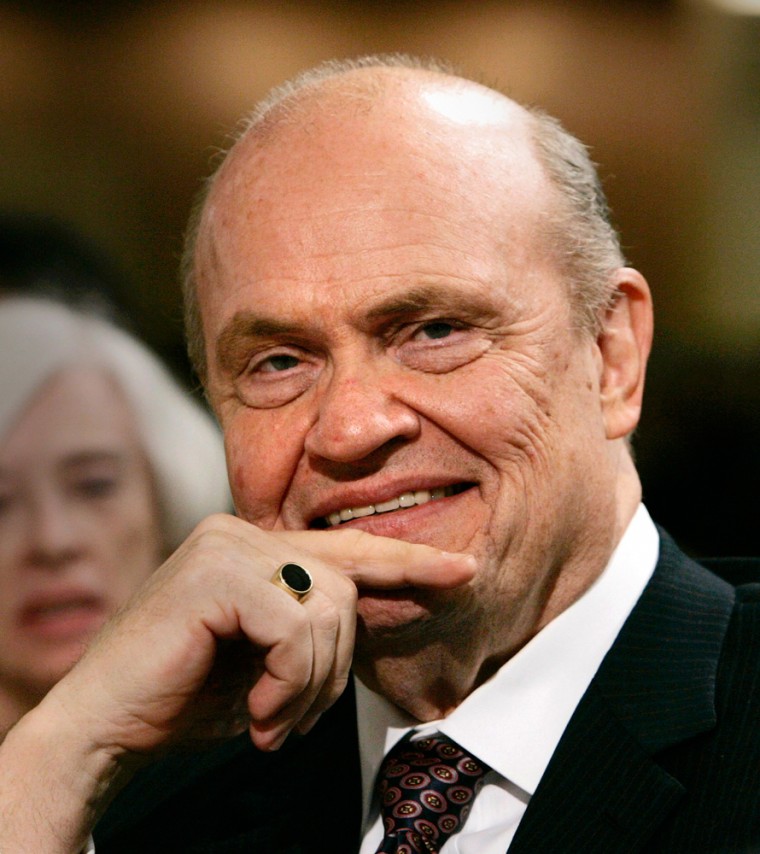If the 'inside the Beltway' conventional wisdom is to be believed, actor and former Tennessee Sen. Fred Thompson will jump into the Republican presidential nomination fight before too long, filling a vacuum that many have long sensed in the GOP race.
So if Thompson does enter the race, who would it hurt? Two recent polls -- one by Peter Hart and Neil Newhouse for NBC News and the Wall Street Journal and the other by RT Strategies for the Cook Political Report -- indicate that Thompson's candidacy would draw most from former New York City Mayor Rudolph Giuliani, perhaps about 4 to 6 points. He would draw minimally, if at all, from Sen. John McCain, R-Ariz., and former Massachusetts Gov. Mitt Romney. Thompson would start out behind Giuliani and McCain and about even with Romney.
To be sure, Thompson is hardly a household name. In the NBC/WSJ poll, only 26 percent of Americans knew enough about him to venture an opinion. Of those who knew enough to judge, 22 percent were favorable, 4 percent were unfavorable. Another 19 percent had neutral feelings, which probably means they know little or nothing about him, while 55 percent confessed to not knowing who he was.
The NBC/WSJ poll of 1,004 adults was taken April 20 through April 23. The Cook survey of 1,000 adults was taken between April 27 and April 29.
The NBC/WSJ poll showed Giuliani leading the pack with 32 percent without Thompson and with 28 percent when Thompson was added to the mix. The Cook poll had Giuliani on top with 39 percent without Thompson, and with 33 percent with a Thompson entry.
The impact on McCain, Romney and former House Speaker Newt Gingrich was less noticeable. McCain had 22 percent in the NBC/WSJ poll without Thompson and 21 percent with him as a candidate. In Cook, McCain was at 24 percent without Thompson and 22 percent with him. Romney stayed at 12 percent in both versions of the Cook poll question; in the NBC/WSJ poll, he had 12 percent without Thompson and 11 percent with Thompson.
Gingrich, who says he will not make a decision about running until this fall, was not included in the NBC/WSJ poll. In Cook, Gingrich had 7 percent without Thompson and 6 percent with him in the race.
Considering that the margin of error for the Republican primary sample is more than 5 points in each poll, it is clear that Thompson's 12 percent doesn't come at the expense of any one candidate but might come from front-runner Giuliani more than the others. This might be an affirmation of the view of many analysts that Giuliani's lead is inflated by his 9/11 performance and is less durable than the support of other candidates in the race.
In the Cook poll ballot test with neither Thompson nor Gingrich in the mix, Giuliani pulled 35 percent, down 7 points from last month. McCain was at 23 percent, compared with 20 percent last time, while Romney moved from 9 percent to 14 percent. The spread between Giuliani in first place and McCain in second that stood at 22 points at the end of March, 42 percent to 20 percent, narrowed to 12 points, 35 percent to 23 percent.
In the Democratic contest, with a 5-point error margin, Sen. Hillary Rodham Clinton of New York holds a 10-point lead, with 36 percent in the Cook poll, down from 41 percent a month ago. Sen. Barack Obama, D-Ill., is at 26 percent, compared with 17 percent a month ago. Former Sen. John Edwards, D-N.C., and New Mexico Gov. Bill Richardson have barely moved. Edwards had 18 percent this time, compared with 19 percent last time, while Richardson was at 5 percent, compared with 3 percent.
If former Vice President Al Gore is plugged into the race, the Cook poll shows Clinton with 32 percent, Obama with 24 percent, Edwards with 15 percent and Gore with 11 percent.
If you assume that Thompson enters the GOP race and that Gore stays out on the Democratic side, the data would suggest that both contests will continue to flatten, that the gap between the front-runner and the third-, fourth- or fifth-place candidate will diminish, creating more of a contest. Clinton and Giuliani are still on top of their respective fields, but their leads are somewhat more precarious than they appeared a couple of months ago.
The first-quarter fundraising report also suggests some flattening as well. Among the Republican candidates, Romney eclipsed Giuliani, whose money numbers weren't that much better than McCain's. Obama, trailing Clinton in the polls, basically raised the same amount of money as Clinton and far exceeded expectations, while Edwards raised enough to remain competitive, particularly considering his strong position in pivotal Iowa.
In short, both the polling data and money are pointing toward more competitive races for each nomination than some might have suspected just a few months ago. Given the Darwinian nature of modern presidential campaigns, the number of candidates in the bottom half of the fields will diminish, with both races narrowing to fights between just three, four or five candidates, perhaps as soon as Labor Day.
